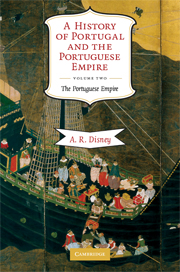Book contents
- Frontmatter
- Contents
- Abbreviations
- List of maps
- Preface
- Maps
- 15 North Africa
- 16 Exploring the Coasts of Atlantic Africa
- 17 Engaging with Atlantic Africa
- 18 The Atlantic Islands and Fisheries
- 19 Breakthrough to Maritime Asia
- 20 Empire in the East
- 21 Informal Presence in the East
- 22 Brazil: Seizing and Keeping Possession
- 23 Formation of Colonial Brazil
- 24 Late Colonial Brazil
- 25 Holding on in India: The Late Seventeenth and Eighteenth Centuries
- 26 Eastern Empire in the Late Colonial Era: Peripheries
- Glossary
- Bibliography
- Index
16 - Exploring the Coasts of Atlantic Africa
Published online by Cambridge University Press: 05 June 2012
- Frontmatter
- Contents
- Abbreviations
- List of maps
- Preface
- Maps
- 15 North Africa
- 16 Exploring the Coasts of Atlantic Africa
- 17 Engaging with Atlantic Africa
- 18 The Atlantic Islands and Fisheries
- 19 Breakthrough to Maritime Asia
- 20 Empire in the East
- 21 Informal Presence in the East
- 22 Brazil: Seizing and Keeping Possession
- 23 Formation of Colonial Brazil
- 24 Late Colonial Brazil
- 25 Holding on in India: The Late Seventeenth and Eighteenth Centuries
- 26 Eastern Empire in the Late Colonial Era: Peripheries
- Glossary
- Bibliography
- Index
Summary
THE ROLE OF PRINCE HENRIQUE
At the start of the fifteenth century, Europeans understood little about the Atlantic outside of their own coastal waters. They regarded with awe and foreboding the mighty Ocean Sea, which stretched away to the north and west into a mysterious world of storms, mists and cold. The south, being almost wholly unknown, they feared even more; many mariners doubted whether any ship that ventured far in that direction could possibly return. Yet, as the century wore on, perceptions changed greatly. Europeans accumulated more and more knowledge about the Atlantic – knowledge based on actual observation and experience. They learned about its wind systems, currents and weather patterns, and they developed the ships, navigational techniques and practical know-how to sail almost anywhere within its waters, confident they could return safely. By the late 1480s they had successfully explored the entire length of Africa's Atlantic coast and found almost all the ocean's significant archipelagoes.
The Portuguese were in the forefront of this momentous process. They were the principal European pioneers of African coastal sailing, and it was they who first rounded the southern tip of Africa, finally passing from the Atlantic into the Indian Ocean. Their voyages along these coasts were therefore the prelude to one of the most significant breakthroughs in world history – the linking of the Atlantic maritime communications system to that of the Indian Ocean.
- Type
- Chapter
- Information
- A History of Portugal and the Portuguese EmpireFrom Beginnings to 1807, pp. 27 - 44Publisher: Cambridge University PressPrint publication year: 2009



